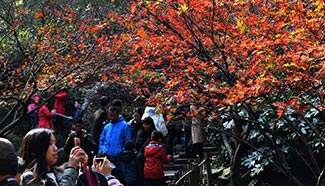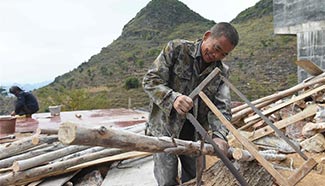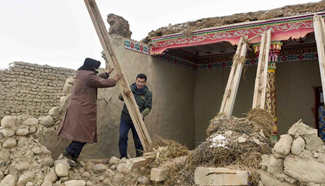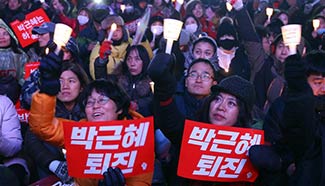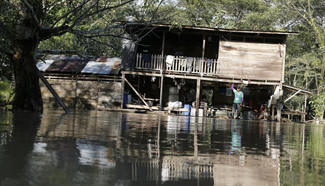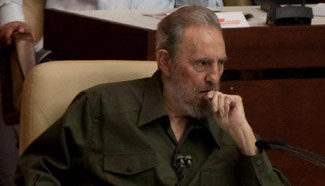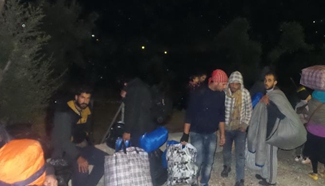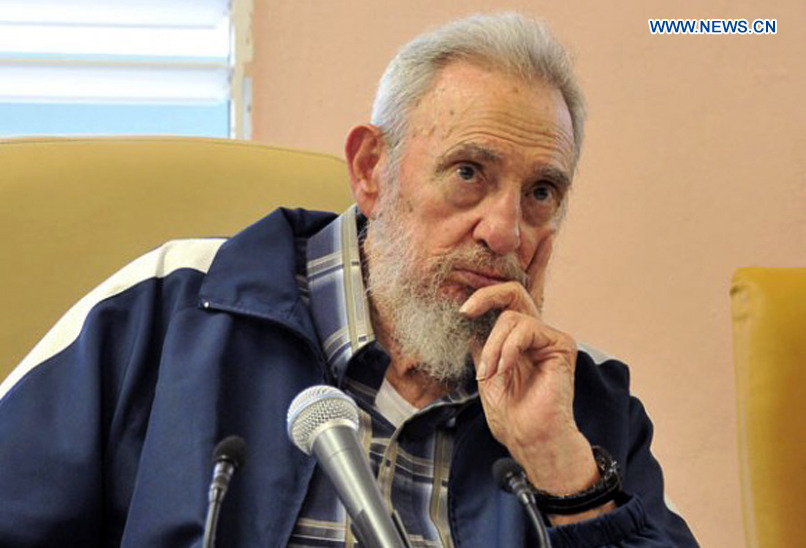
File photo taken on April 11, 2013 shows Fidel Castro attending the inauguration of a school in Havana. Cuban revolutionary leader Fidel Castro has died at 90, local media said on Nov. 26, 2016. (Xinhua/Cubadebate)
By Raimundo Urrechaga
HAVANA, Nov. 26 (Xinhua) -- Cuba's revolutionary leader and former president, Fidel Castro, died at the age of 90 late Friday, Cuban President and his brother, Raul Castro, announced in a national broadcast.
Castro was born on Aug. 13, 1926 into a wealthy family in Biran in northeastern Cuba.
Son of Spanish landowner, Angel Castro and young Cuban peasant, Lina Ruz, from young he demonstrated athletic abilities, outstanding intelligence and a passion to defend social justice.
He attended private schools before entering the University of Havana to study law in 1945. Five years later when he graduated, he had acquired a political awareness that led him to develop anti-imperialist revolutionary ideas closely related to Marxist values.
In 1953, he was sentenced to 15 years in prison after a military operation he launched on July 26 against the then Cuban dictator Fulgencio Batista failed, but he was released due to a presidential pardon in May 1955.
His self-defense plea, better known as "History Will Absolve Me," became a programmatic document and made him a leading figure of Cuba's revolutionary movement.
Castro then organized the 26th of July Movement and fled to Mexico where he was joined by other exiled revolutionaries, including his brother Raul Castro, Ernesto "Che" Guevara and Camilo Cienfuegos, aiming to form a guerrilla force to overthrow Batista.
In December 1956, he led the Granma yacht expedition with 82 men aboard to return Cuba. Castro and 11 others managed to head to the Sierra Maestra mountains and later started the war of Cuban Revolution against Batista.
In January 1959, Batista fled Cuba for Spain when the revolutionary forces marched into Havana.
After becoming the head of the revolutionary government and armed forces, Castro undertook a series of reforms including nationalization of industries and banks, land reform, a nationwide literacy campaign and the expropriation of American companies, among others.
In 1961, Castro declared Cuba a socialist country, and in 1965, he became First Secretary of the Communist Party of Cuba, which was a renamed merger between the 26th of July Movement and other Cuban political and revolutionary groups.
His policies met with strong opposition of the United States, which broke diplomatic ties with Cuba, organized military offensives and imposed sanctions against Cuba, among others.
Castro had survived a lot of U.S. assassination attempts on his life.
He had led Cuba for nearly half a century before stepping down in 2006 for health reasons. He was succeeded by his brother Raul Castro.
Castro spent the last years of his life largely out of the public eye, writing editorials on world affairs for Cuba's official Granma daily, and receiving dignitaries at his home in Havana.
He is believed to have inspired a new generation of political leaders in Latin America, such as in Bolivia, Venezuela and Ecuador.
His legacy can also be seen in Cuba's universal healthcare and education system, as well as its world-class biotechnology and pharmaceutical industry.
Related:
Spotlight: Fidel Castro and his mark on contemporary political literature
HAVANA, Aug. 13 (Xinhua) -- The historic leader of the Cuban Revolution, former president Fidel Castro, celebrates his 90th birthday on Saturday. While he has retired from public life, he has left an indelible mark on contemporary political literature. Full story
Feature: Fidel Castro: 90 years of history and resistance
HAVANA, Aug. 13 (Xinhua) -- Cuba's revolutionary leader and former president Fidel Castro turns 90 years old on Saturday as a symbol of historic resistance against the U.S. and upholding the socialist values that have led this Caribbean nation to unprecedented development for a third world country. Full story
Interview: Fidel Castro, most targeted leader by his adversaries
HAVANA, Aug. 11 (Xinhua) -- For more than half a century, Cuban leader Fidel Castro has been a target for many of his political enemies and adversaries that tried to topple the socialist regime in the island country by any means, including his assassination. Full story
Interview: Fidel Castro's influence universal, says historian
CARACAS, Aug. 10 (Xinhua) -- As revolutionary leader Fidel Castro nears his 90th birthday on Aug. 13, the international spotlight has once again turned towards Cuba, the nation he shaped into one of the Caribbean's most developed in terms of education, healthcare and life expectancy. Full story
Feature: Fidel Castro an enduring role model for Cuban youth
HAVANA, Aug. 8 (Xinhua) -- Many Cubans are too young to remember Fidel Castro's heyday as a revolutionary firebrand and influential elder statesman, yet they admire and look up to the historic figure. Full story




